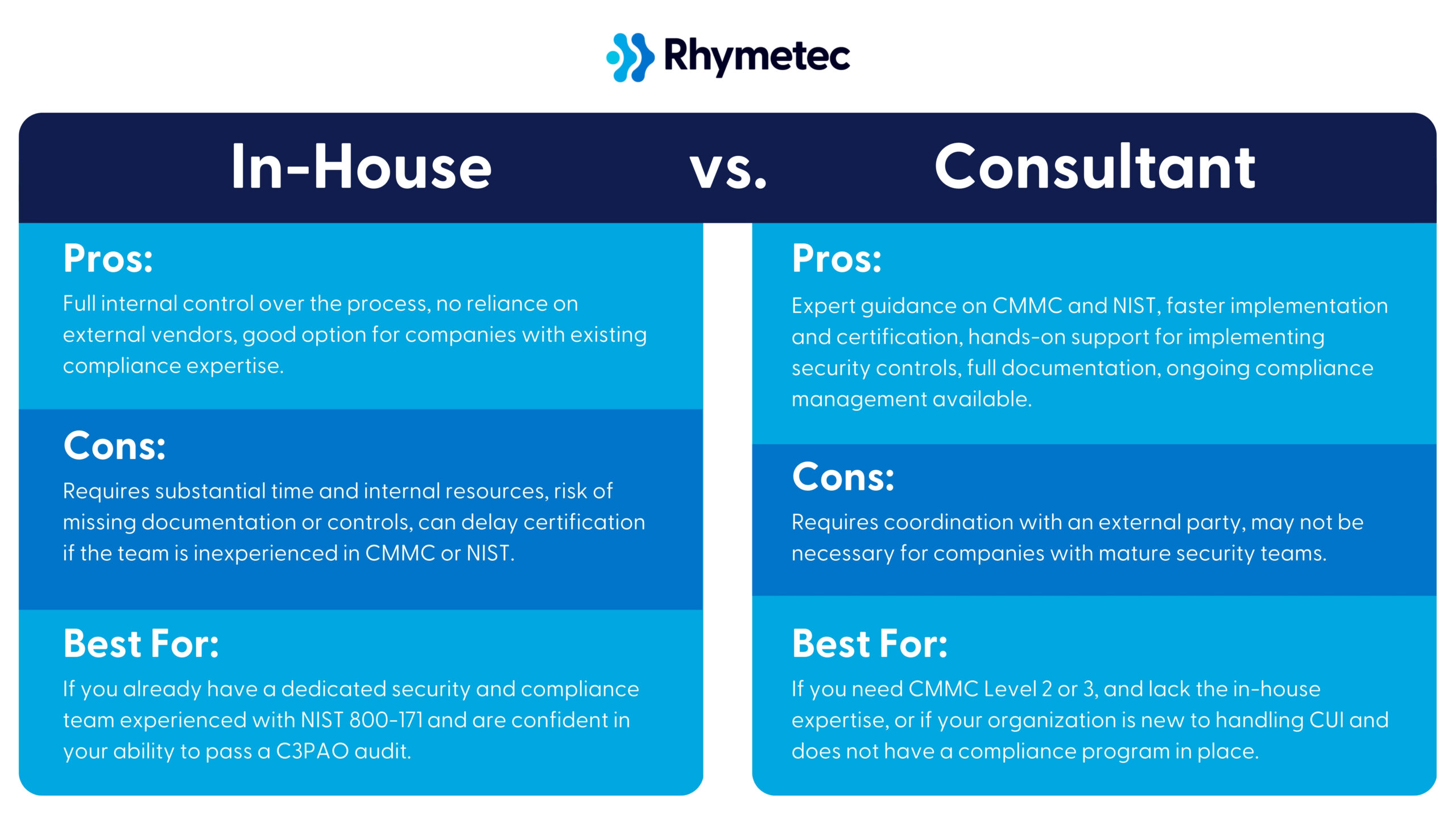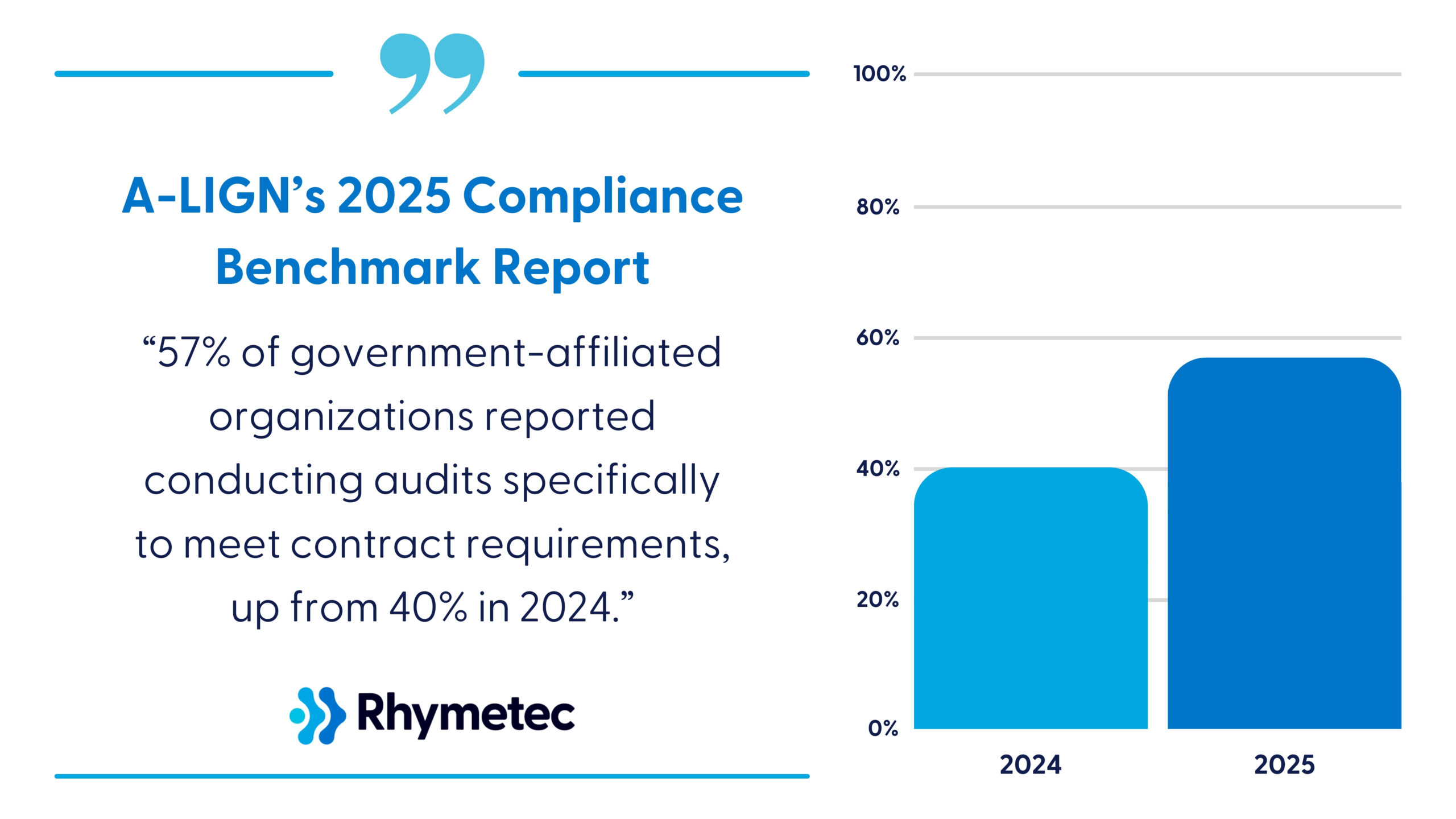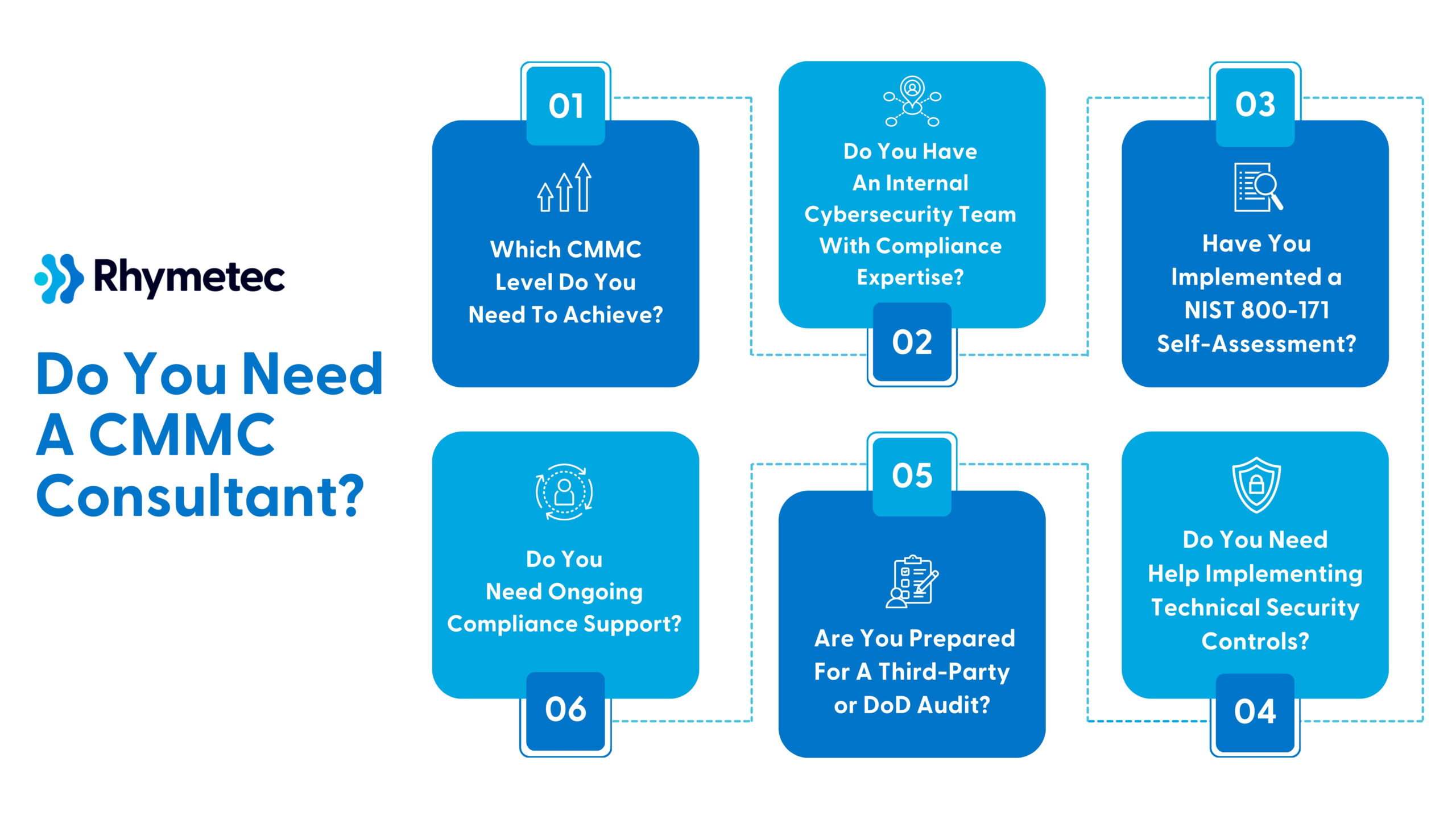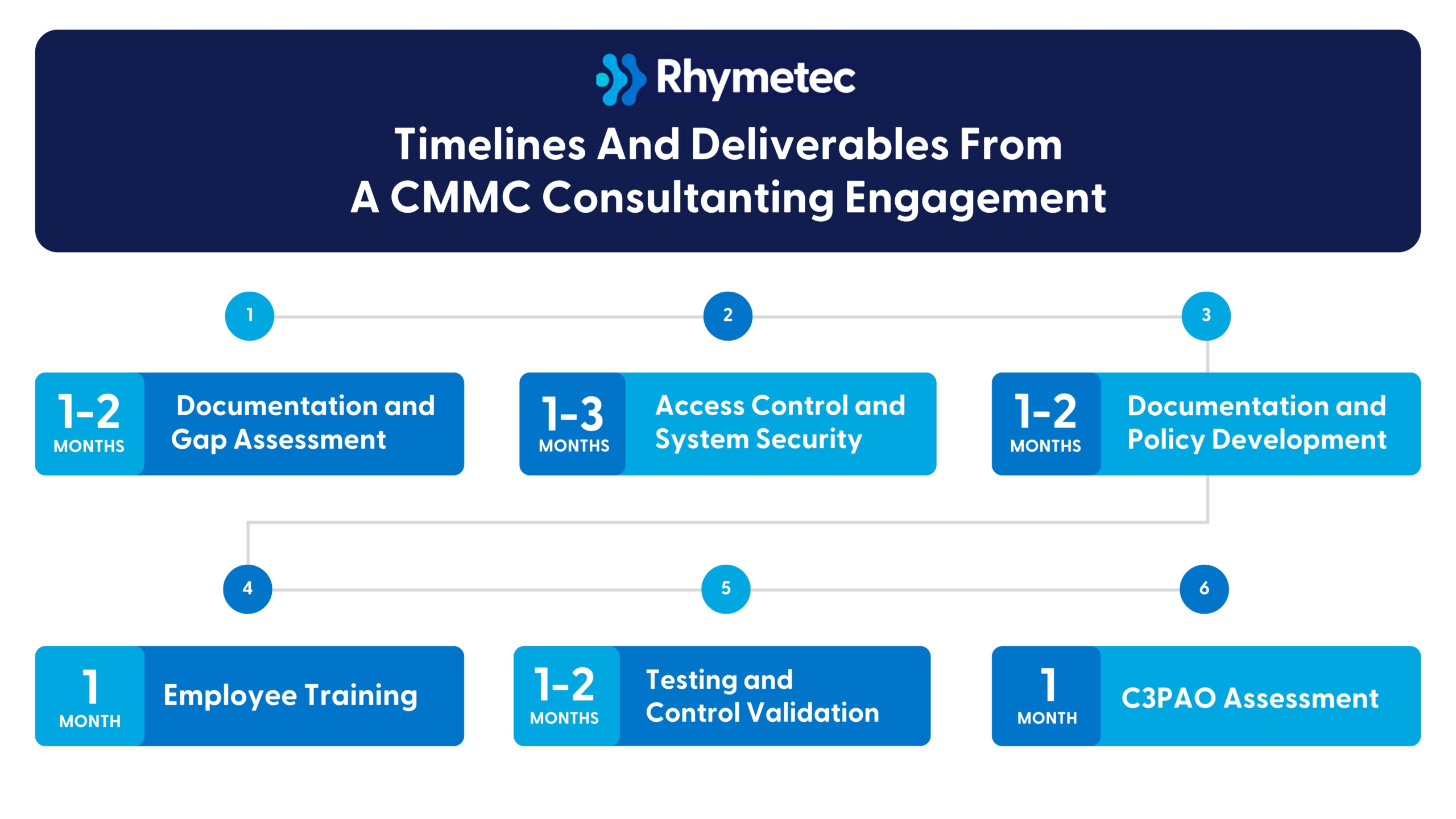Working with a CMMC consultant is an attractive option for many organizations seeking to meet the updated CMMC requirements nowadays.
The Department of Defense (DoD) released CMMC 2.0 on October 15th, 2024, a requirement for defense contractors and subcontractors with the goal of improving cybersecurity standards. The updated version refines the original framework, aiming to simplify the path to compliance while maintaining the highest security standards for organizations that handle Controlled Unclassified Information (CUI) and other sensitive contract data.
One way in which the updated version simplifies compliance is by aligning requirements even more closely with existing cybersecurity standards like NIST SP 800—171. Many organizations may already comply with NIST 800-171 or another framework very closely aligned with it. Either way, the shift in compliance expectations has led many organizations to assess whether they have the in-house resources to manage security or if they need external support through a CMMC consultant.
Working with a Managed Security Services Provider that offers CMMC consulting services (like Rhymetec!) can help contractors meet CMMC 2.0 requirements efficiently. MSSPs take the work off your plate and help you meet your goals in the fastest time frame possible. We've helped over 1,000 organizations meet their compliance and security requirements in the fastest time frame possible.
In this article, we go over how CMMC 2.0 works, the options available for achieving compliance, and the potential advantages of working with a CMMC consultant.
What Is A CMMC Consultant, and What Do They Do?
Unless you have a fully built-out in-house cybersecurity and compliance team, CMMC can be a massive project to take on internally—taking a year or longer to meet requirements. This is where a CMMC consultant comes in.
A CMMC consultant is a cybersecurity and compliance expert who helps defense contractors meet the requirements of the Cybersecurity Maturity Model Certification (CMMC) 2.0. Consultants do everything from conducting a gap assessment to see where you are versus where you need to be, developing practical strategies to achieve compliance that will fit seamlessly (and as non-disruptively as possible!) into your operations, and guiding you through the certification process in partnership with an external auditor.
For many businesses, especially small and mid-sized contractors, understanding and implementing CMMC controls can be challenging. A CMMC consultant provides tailored, specialized knowledge to streamline the entire process, reduce your risk of non-compliance, and make big improvements to your overall security if you do not already have certain measures in place.
Do You Need A CMMC Consultant?
The best way to determine if you need a CMMC consultant is to look through the responsibilities and deliverables in the next section and assess whether or not you have the in-house capacity to fulfill all of these items.
If you are a larger organization and already have a security team with personnel that can accomplish the necessary tasks for CMMC (A Chief Information Security Officer, Penetration Tester, Cloud Security Specialist, Vulnerability Management Analyst, etc.), you can probably do most of this on your own or with guidance from a CMMC consultant rather than full support.
However, for smaller organizations or those without a fully developed in-house security program, engaging a CMMC consultant entails multiple benefits.
According to A-LIGN’s 2025 Compliance Benchmark Report, 57% of government-affiliated organizations reported conducting audits specifically to meet contract requirements, up from 40% in 2024. DoD contractors and subcontractors will need to obtain certification under one of three trust levels to demonstrate that they have adequately implemented cybersecurity measures.
Below are some questions to help you assess whether working with a consultant is the right choice. After you answer these questions and review the responsibilities and deliverables listed below in the next section, you should have a clear picture of whether or not you need a CMMC consultant:
1. Which CMMC Level Do You Need To Achieve?
The CMMC level you need depends on the type of contracts you handle:
CMMC Level 1 (Basic Cyber Hygiene) is required for contractors who only handle Federal Contract Information (FCI). Compliance is self-assessed, but security controls must still be implemented.
CMMC Level 2 (Advanced Cyber Hygiene) is required for contractors who handle Controlled Unclassified Information (CUI). Compliance requires a third-party assessment (C3PAO) every year.
CMMC Level 3 (Expert) is required for contractors who are working on high-security DoD projects. Compliance entails DoD-led audits and adherence to NIST SP 800-171 and portions of NIST SP 800-172.
If you need CMMC Level 2 or Level 3, working with a CMMC consultant can be extremely helpful, given the amount of work involved in the third-party assessment process, implementing missing security controls, and maintaining ongoing compliance.
2. Do You Have An Internal Cybersecurity Team With Compliance Expertise?
If you have a dedicated cybersecurity and compliance team, you may be able to handle CMMC requirements internally. Even if you do have an internal team, however, a CMMC consultant can still be beneficial if:
- Your internal team is unfamiliar with NIST 800-171 and CMMC requirements.
- You need help preparing evidence for a third-party assessment.
- Your security team does not specialize in compliance or lacks the expertise to develop CMMC procedures and policies.
3. Have You Implemented a NIST 800-171 Self-Assessment?
If you need CMMC Level 2 or Level 3, you should already have a NIST 800-171 self-assessment and an SPRS score recorded. If you haven't completed this step, a CMMC consultant can guide you through the process. Additionally, if your SPRS score is low, or if you have many missing security controls, you may need a consultant to develop a remediation strategy before moving forward.
4. Do You Need Help Implementing Technical Security Controls?
There are a range of technical security controls required by CMMC that many organizations may not have adopted yet. If your company lacks the bandwidth to deploy these measures, a CMMC consultant can provide guidance and support (or do it for you, depending on the level of support outlined in the engagement). These types of technical controls include configuring multi-factor authentication, implementing network segmentation, SIEM logging and monitoring, and vulnerability management.
5. Are You Prepared For A Third-Party or DoD Audit?
For Levels 2 and 3, organizations have to pass an official assessment conducted by a Certified Third-Party Assessor Organization (C3PAO) or the DoD. The most common issues contractors face with these assessments are due to insufficient documentation, improperly implemented controls, or lack of audit preparation. A CMMC consultant can remediate these issues and more in advance of your assessment.
6. Do You Need Ongoing Compliance Support?
Lastly, it's important to know that CMMC compliance requires ongoing monitoring and maintenance. You'll need to keep your certification in good standing year-round. If your organization does not have a dedicated team to handle continuous compliance, a CMMC consultant can provide long-term security and compliance management. Ongoing support can include:
- Review of your security controls
- Vulnerability scanning (and remediation as needed)
- Incident response drills
- Log reviews and SIEM tuning.
If the answer is "yes" to multiple questions, partnering with a CMMC consultant may be a good option for your organization.
Next, let's go over what a CMMC consultant typically accomplishes for organizations throughout the engagement. This should help give you a good idea of what to expect:
Timelines And Deliverables From A CMMC Consultanting Engagement
A CMMC consultant provides end-to-end support to help defense contractors achieve CMMC compliance. At a high level, this process entails assessing your organization's current security posture, implementing the required controls you don't already have, developing documentation, training personnel, and preparing for the official assessment.
Here is what this process and the deliverables will look like, in general, for an organization starting from a more basic security posture:
1. CMMC Initial Assessment - Documentation and Gap Assessment:
- Conduct a gap assessment to assess your current CMMC maturity level.
- Review existing security documentation to determine alignment with CMMC 2.0. requirements and identify any gaps in your documentation to be addressed before certification.
- Review CUI/FCI data flows to assess how sensitive information is handled.
- Map current security controls to NIST SP 800-171 and CMMC requirements.
- Document your organization's Supplier Performance Risk System (SPRS) score.
- Develop a preliminary Plan of Action & Milestones (POA&M) to address deficiencies.
- Estimate resource requirements for remediation.
Timeline With A CMMC Consultant: 1-2 Months
2. Implementation of Access Control and System Security
- Configure multi-factor authentication (MFA) for all required systems.
- Implement least privilege access principles to restrict user permissions.
- Set up remote access controls and document access control procedures.
- Deploy a Privileged Access Management (PAM) solution for sensitive accounts.
- Implement network segmentation and develop network diagrams.
- Deploy endpoint protection solutions.
- Configure logging and monitoring systems, including SIEM solutions.
- Set up backup solutions and document backup and recovery procedures.
Timeline With A CMMC Consultant: 1-3 Months
3. Documentation and Policy Development
- Develop a System Security Plan (SSP) documenting security controls.
- Create an Incident Response Plan for handling security incidents.
- Establish a Disaster Recovery Plan.
- Create training documentation for security awareness and compliance.
Timeline With A CMMC Consultant: 1-2 Months
4. Training
- Conduct security awareness training for employees.
- Develop role-specific training for personnel handling CUI/FCI.
- Run incident response drills to prepare teams for cyber threats.
- Train employees on documentation procedures.
- Hold policy review sessions.
Timeline With A CMMC Consultant: 1 Month
5. Testing and Control Validation
- Perform internal control testing to verify compliance.
- Conduct vulnerability assessments and penetration testing to evaluate system defenses.
- Review security documentation for accuracy/completion.
- Validate processes and security controls through real-world testing.
Timeline With A CMMC Consultant: 1-2 Months
6. C3PAO Assessment
- Conduct a final documentation review to make sure all requirements have been met.
- Validate security controls against CMMC 2.0 standards.
- Prepare teams for staff interviews conducted during the official assessment.
- Perform technical testing to confirm systems meet all requirements.
Timeline With A CMMC Consultant: 1 Month
Ongoing Maintenance
To maintain compliance and readiness for recertification, a CMMC consultant provides ongoing support through the following:
- Monthly security control reviews to assess compliance status on an ongoing basis.
- Vulnerability scanning to identify and remediate emerging threats.
- Access reviews to ensure permissions remain properly restricted.
- Incident response testing to evaluate security team preparedness.
- Log review to monitor system activity and detect anomalies.
Why Work With A CMMC Consultant?
Achieving compliance is not simple. There is an array of technical and procedural controls and extensive required documentation. A CMMC consultant helps businesses navigate these requirements by providing specialized expertise (at a much lower price point than building out an in-house team would cost) and reducing administrative burdens.
Many defense contractors lack the in-house resources to manage requirements, especially as the DoD increases enforcement of cybersecurity standards. Often, for example, small defense contractors with no formal cybersecurity programs need to achieve CMMC Level 1 to continue bidding on DoD contracts. Having limited IT staff and a lack of security policies and policies can be a significant roadblock.
In this scenario, a CMMC consultant would help by starting with an initial assessment to determine the company's current security posture and documentation and, from there, develop all missing policies, procedures, and documents. Often, this includes a System Security Plan (SSP), access control policies, and an incident response plan.
Many contractors also underestimate the complexity of CMMC and wait too long to start the process. The risk of failing an assessment can lead to contract loss and reputational damage. Working with a CMMC consultant reduces risk, streamlines implementation, strengthens your cybersecurity, and ensures you stay audit-ready year-round.
If your business relies on DoD contracts, CMMC certification isn't optional. Engaging a CMMC consultant early on in the process saves significant time and headaches down the road.
About Rhymetec
Our mission is to make cutting-edge cybersecurity available to SaaS companies and startups. We’ve worked with hundreds of companies to provide practical security solutions tailored to their needs, enabling them to be secure and compliant while balancing security with budget. We enable our clients to outsource the complexity of security and focus on what really matters – their business. Contact us today to get started.
Interested in reading more? Check out more content on our blog.



